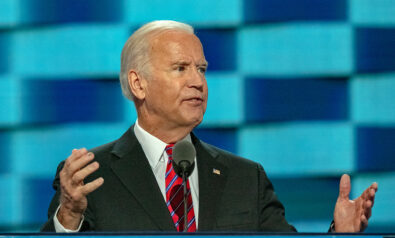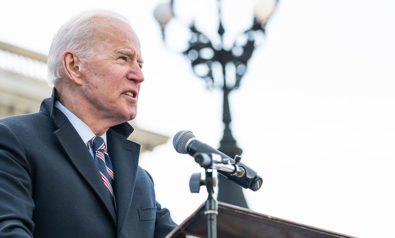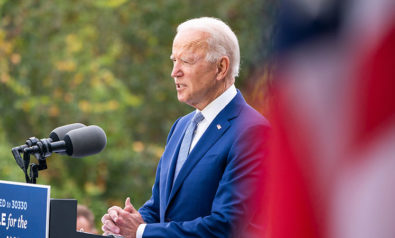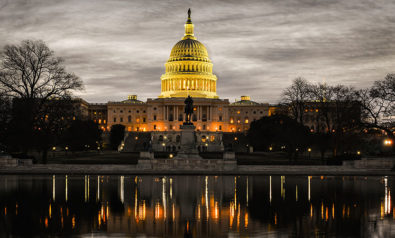While the economy and COVID-19 may dominate discussions around the coming US election, environmental issues and climate change, mainly due to the recent wildfires in the state of California, may also be a differentiating factor between the two presidential candidates. Back in January 2017, in my article titled “Trumping the Climate,” I lamented the uncertainties and questions ahead of Donald Trump’s inauguration, particularly relating to climate change policy. As we approach the 2020 election, what can we say about the legacy of the Trump administration and its stated future policies, and what of Biden’s policy directions as presented in the party platforms?
360˚ Context: The 2020 US Election Explained
The contrast between the alternative policies couldn’t be starker. The most baffling aspect is the Republican decision to adopt the same platform the party used in 2016. It would have been logical to update the document and delete sentences such as “Over the last eight years, the Administration has triggered an avalanche of regulation that wreaks havoc across our economy and yields minimal environmental benefits.” The next sentence states that “The central fact of any environmental policy is that year by year, the environment is improving.” Did someone in the Republican camp actually review this document?
Trumping the Climate
But before comparing the Republican and the Democratic platforms, it would be useful to recap the actions of the current administration relating to the environment and climate change. Based on research from Harvard Law School, Columbia Law School and other sources, more than 70 environmental rules and regulations have been officially reversed, revoked or otherwise rolled back under Trump. Another 26 rollbacks are still in progress. Here are some of the most significant rollbacks introduced.
Paris Climate Agreement. The formal notice given by the Trump administration to withdraw from the 2015 Paris accords was a clear signal of its intent to not only cease its cooperation in global actions to address climate change but also to question the science behind it. By doing so, the US became one of only three countries not to sign on to the Paris Climate Agreement. The pulling out of any major player from international climate accords has to be seen as a huge setback — and it is. Perhaps more importantly, such action also undermines US involvement and leadership in other UN and international forums. It may also strain US trade and other relationships with the EU and other nations.
Clean Power Plan. As one of President Barack Obama’s key environmental policies, the plan required the energy sector to cut carbon emissions by 32% by 2030. It was rolled back by Trump’s Environmental Protection Agency (EPA) in 2017 citing “unfair burdens on the power sector and a ‘war on coal.’” The GOP platform states that “We will likewise forbid the EPA to regulate carbon dioxide, something never envisaged when Congress passed the Clean Air Act.” It can be argued that the energy sector is already heading toward low-carbon alternatives, and clean energy is no more a war on coal than a healthy diet is on junk food. Admittedly, the transition to low-carbon energy will nevertheless require government initiatives and incentives, at least in the short term.
Air pollution regulations. The control of hazardous air pollution has been significantly diminished through the weakening of the Clean Air Act, whereby major polluters such as power plants and petroleum refineries, after reducing their emissions below the required limits, can be reclassified and can emit dangerous pollutants to a higher limit. Using my earlier analogy, this is like having a single healthy meal, then continuing to eat junk food.
Methane flaring rules. Methane is a much more powerful greenhouse gas than, say, carbon dioxide. The rollback of EPA standards for methane and other volatile organic compounds that were set back in 2012 and which resulted in significant reductions in methane emissions. Relaxing those regulations gives states control of their own standards, creating discrepancies in flaring rules between states.
Oil and natural gas. The move to encourage more oil and gas production clearly works against clean air initiatives. Apart from greenhouse gas emissions, the burning of fossil fuels emits significant amounts of other pollutants into the environment. Admittedly, there are economic and international demand-and-supply factors for consideration here. No doubt, US self-sufficiency in oil and gas supply is an important and appropriate dynamic.
Fuel economy rules. The weakening of the fuel economy rules reduced the previously set target of 54 mpg by 2025 for cars made after 2012 to 34 mpg. The fuel efficiency of road vehicles is an important aspect of economic transport and air pollution and its health impacts.
Overall, the fundamental direction of the above changes in policy pulls back progress made by the Obama administration toward cleaner air and mitigating climate change, giving a higher priority to oil and gas, as well as assumed economic growth. More broadly, it ignores the importance of the global agreement and action on climate change and significantly undermines scientific consensus. Ironically, it could also be seen to be contrary to current and future market and economic forces, and as defiance of science in general. Furthermore, it’s intriguing that the establishment of a low-carbon economy, with its technology-driven projects and the building of more resilient infrastructure, isn’t seen as job-creating.
The Trump administration made numerous other environmental policy changes dealing with water and wildlife management and opening of public land for business. Clearly, the Trump administration does not see climate change as a national emergency or an area of priority for policy direction, nor does it see a low-carbon economy as an economic opportunity.
The continuing increase in wildfire frequency and severity as well as other extreme weather events alongside Trump’s persistent denial of climate change impacts continues to intrigue and frustrate experts in the field. On the one hand, the GOP platform asserts that “Government should not play favorites among energy producers” and on the other, appears to ignore renewable energy sources even though these are just as much “God-given natural resource” as oil and gas.
The Biden Plan
Now let’s look briefly at the Democratic Party Platform for the environment and climate change. In summary, the stated initiatives in the Biden plan are as follows.
Climate change. The platform is unequivocal in its acceptance of climate change and its social, economic and environmental impacts, pledging a $2-trillion accelerated investment in “ambitious climate progress” during his first term. It is also unambiguous in the measures it plans to take to reduce inequities in how climate change affects low-income families, and the importance of building “a thriving, equitable, and globally competitive clean energy economy that puts workers and communities first and leaves no one behind.” Economists agree that due to advances made in clean energy and its economics, net-zero emissions are not only achievable, but are now cost-effective and provide a cleaner environment in a world with a growing population and the inevitable increase in the consumption of resources.
Paris Climate Agreement. The platform is once again clear in its intent to “rejoin the Paris Climate Agreement and, on day one, seek higher ambition from nations around the world, putting the United States back in the position of global leadership where we belong.” This would help recalibrate the global efforts and provide a boost to the international impetus for progress on climate change. The importance of binding global agreements and actions cannot be overstated if the world is to significantly mitigate climate change.
Toward net-zero emissions. The platform commits to “eliminating carbon pollution from power plants by 2035 through technology-neutral standards for clean energy and energy efficiency.” It further commits to the installation of 500 million solar panels, including 8 million solar roofs and 60,000 wind turbines and to turning “American ingenuity into American jobs by leveraging federal policy to manufacture renewable energy solutions in America.” Reading the platform’s language and overall framework and knowing what I know about renewable energy and low-carbon technologies, I can’t help feeling that the Democratic platform must have accessed credible and comprehensively developed scientific and economic analyses.
Auto industry. The Democrats pledge to “inform ambitious executive actions that will enable the United States to lead the way in building a clean, 21st century transportation system and stronger domestic manufacturing base for electric vehicles powered by high-wage and union jobs … and accelerate the adoption of zero-emission vehicles in the United States while reclaiming market share for domestically produced vehicles.” Numerous other initiatives include transitioning the entire fleet of 500,000 school buses to American-made, zero-emission alternatives within five years and to support private adoption of affordable low-pollution and zero-emission vehicles by partnering with state and local governments to install at least 500,000 charging stations.
Sustainable communities. The platform is ambitiously broad in its coverage of sustainable initiatives across all communities including agriculture, marginalized communities, climate resilience, disaster management, planting of trees for reduction of heat stress, education and training, public land management, energy efficiency and sustainable housing, sustainable energy grids in remote and tribal communities — all with job creation and economic growth in mind.
How the above differences in policy and direction in the US election are likely to play out in November are difficult to ascertain. Whichever way America votes will considerably affect the nation’s future in addressing not only its own climate change responses, but will carry a significant impact for the rest of the world.
The views expressed in this article are the author’s own and do not necessarily reflect Fair Observer’s editorial policy.
Support Fair Observer
We rely on your support for our independence, diversity and quality.
For more than 10 years, Fair Observer has been free, fair and independent. No billionaire owns us, no advertisers control us. We are a reader-supported nonprofit. Unlike many other publications, we keep our content free for readers regardless of where they live or whether they can afford to pay. We have no paywalls and no ads.
In the post-truth era of fake news, echo chambers and filter bubbles, we publish a plurality of perspectives from around the world. Anyone can publish with us, but everyone goes through a rigorous editorial process. So, you get fact-checked, well-reasoned content instead of noise.
We publish 2,500+ voices from 90+ countries. We also conduct education and training programs
on subjects ranging from digital media and journalism to writing and critical thinking. This
doesn’t come cheap. Servers, editors, trainers and web developers cost
money.
Please consider supporting us on a regular basis as a recurring donor or a
sustaining member.
Will you support FO’s journalism?
We rely on your support for our independence, diversity and quality.




































